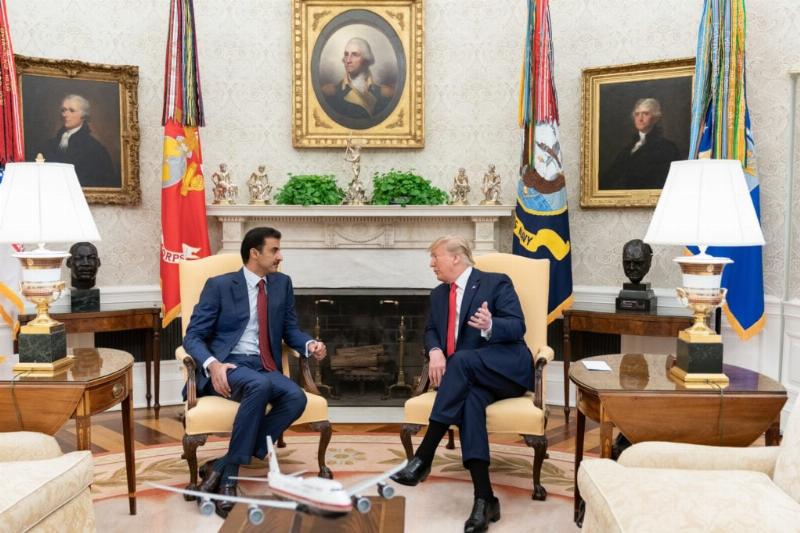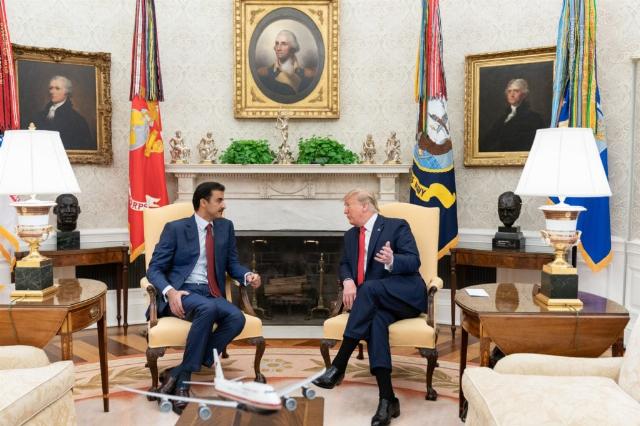


President Trump’s new executive order pledging to “guarantee the security and territorial integrity of the State of Qatar against external attack” comes as a surprise. It is unusual -- borderline radical -- for a president acting alone to extend what amounts to a security guarantee to a country with a well-documented history of supporting extremist groups, including Hamas, the Taliban, and the Muslim Brotherhood. Critics are right to demand answers. The White House will need to explain how this step fits within constitutional limits and U.S. counterterrorism principles.
Yet even with those concerns, this move is not necessarily a slap in the face to Israel. In fact, if tethered to strict conditions and strategic discipline, it may strengthen both U.S. and Israeli security at a volatile moment.
The Spark: an Israeli Strike on Doha
On September 9, Israel launched an unprecedented airstrike in Doha aimed at Hamas leadership quarters, killing several people, including a Qatari security officer. Qatar denounced the strike as a violation of sovereignty and threatened retaliation. The attack imperiled more than Qatari pride -- it threatened to unravel the delicate network of U.S. basing, coalition partnerships, and hostage diplomacy in the Gulf.
In the days that followed, the Trump administration faced a stark choice: say nothing and risk Gulf allies losing faith in Washington or take a public step to steady the board. The executive order is that step. It is a policy declaration, not a Senate-ratified treaty. Unlike NATO’s Article 5, it does not lock America into automatic war, but it signals that an attack on Qatar would be treated as a threat to U.S. security.
Why Washington Sees This as Necessary.
1. Protecting U.S. forces and infrastructure. Qatar hosts Al Udeid Air Base, the forward headquarters for U.S. Central Command, with thousands of American personnel and critical command functions. Without reassurance, adversaries could see the Doha strike as a green light to test U.S. basing or infrastructure. The executive order shores up deterrence and tells Iran and other spoilers: do not even think about it.
2. Preserving essential diplomatic channels. Qatar is both problematic and indispensable. Doha has served as the key mediator in hostage negotiations with Hamas, and as a channel to other Islamist actors. Whatever one thinks of Qatari duplicity, the United States cannot ignore the fact that Qatar often holds the keys to keeping Americans and allies alive in Gaza and elsewhere. If Doha had pulled back after the strike, U.S. leverage would have shrunk. The order helps keep them at the table.
3. Reassuring Gulf partners. Gulf states closely watch whether Washington protects -- or ignores -- their sovereignty. Doing nothing after an Israeli strike on Doha could have rattled the entire Gulf Cooperation Council and encouraged hedging toward China, Russia, or Iran. By extending a conditional guarantee, Washington reassures Gulf allies and preserves coalition glue that ultimately benefits Israel.
 4. Offering deterrence without a treaty. Because this is a policy statement, not a mutual defense pact, the United States retains flexibility. Responses can be diplomatic, economic, or military, depending on the threat. Future administrations can amend it. This is a calibrated message, not a blank check.
4. Offering deterrence without a treaty. Because this is a policy statement, not a mutual defense pact, the United States retains flexibility. Responses can be diplomatic, economic, or military, depending on the threat. Future administrations can amend it. This is a calibrated message, not a blank check.
5. Using leverage to demand better behavior. Qatar’s history with extremists cannot be swept aside. But the order provides leverage. Washington can tie the security guarantee to verifiable steps: tightening terror finance, expelling Hamas leaders, policing its charities, and enforcing sanctions. If Qatar balks, the policy can be revoked.
Why This is not a Rebuke to Israel.
It is tempting to see the order as punishing Israel for defending itself. It is not. The executive order concerns Qatar’s sovereignty against external attack; it does not immunize Hamas operatives or restrict Israel from lawful counterterrorism actions.
Indeed, by stabilizing Qatar, Washington helps safeguard U.S. bases and command functions that support Israel’s defense. The order can also serve as a bridge of de-escalation, helping prevent the Gaza conflict from spiraling into a broader Gulf war.
Importantly, the order does not elevate Qatar to NATO-ally status. Israel still enjoys a unique U.S. security partnership, underpinned by congressional appropriations, intelligence integration, and missile defense cooperation. Qatar is being offered a conditional shield in a moment of crisis -- not parity with Israel.
The Real Risks
Still, this move is risky. It invites charges of executive overreach. It could embolden Qatar if not coupled with strict benchmarks. It could set precedents for other partners demanding similar guarantees. And it could spark domestic backlash: why offer protection to a state with such a troubling record?
These are fair questions. The White House must clarify the doctrine, define conditions, consult Congress, and emphasize the priority of counterterrorism.
The Bottom Line
Trump’s executive order is an unsettling precedent. It extends a unilateral U.S. security pledge to a controversial partner. But it is also a calculated response to a destabilizing moment: an Israeli strike in Doha that threatened to fracture Gulf alliances, undermine hostage talks, and expose U.S. forces to attack.
If disciplined properly -- anchored in deterrence, conditionality, and transparency -- it could serve America’s interests and even Israel’s security. The alternative, silence in the face of regional rupture, might have been worse.
Robert Maginnis is a retired US Army infantry officer and the author of thirteen books, the latest becomes early November, AI for Mankind’s Future.
Image: White House
